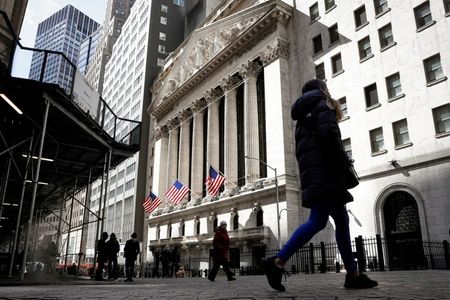By Alwyn Scott
NEW YORK (Reuters) – Global stocks mostly fell Tuesday along with bond yields and crude prices, as China’s latest tech crackdown and expectations of a hawkish Fed report on Wednesday waved red flags at investors. The dollar edged higher.
The tech-heavy Nasdaq Composite index withstood the stocks downdraft. After falling nearly 1% by mid-day, it rallied to close up 24.32 points, or 0.17 percent, at 14,663.64.
Earlier, Chinese regulators cracked down on U.S.-listed ride-hailing company Didi Global Inc, sending its shares down more than 20%. Other U.S.-listed Chinese e-commerce firms, including Alibaba Group, Baidu Inc and JD.com, fell 3.5% to 4.6%.
Broader stock gauges eased ahead of Wednesday’s release of minutes from the U.S. Federal Reserve’s Federal Open Market Committee (FOMC). Most investors expect the FOMC to confirm a hawkish tilt, meaning a slow tightening of monetary policy.
But a benign readout could trigger a “risk-gone rally” on the view that lax Fed policy will continue, said Edward Moya, senior market analyst for the Americas at OANDA.
Despite the U.S. economic recovery, many millions remain jobless due to the pandemic, so the United States still has room before the economy really revs up, he added.
The broad S&P 500 lost 8.8 points, or 0.20 percent, to 4,343.54 and the widely watched Dow Jones Industrial Average fell 208.98 points, or 0.6 percent, to 34,577.37.
The dollar index, which tracks the greenback versus a basket of six currencies, rose 0.324 point or 0.35 percent, to 92.536. The yen was up 0.01 percent, at $110.6100.
U.S. bond yields fell after data suggested the U.S. economy might not be as hot as some fear. A gauge of the large U.S. services sector showed moderate growth in June, down from a record pace in May.
The data buttressed Friday’s U.S. employment report, which many saw as showing an improving labor market, but not at a fast enough pace to signal an economy prone to overheating.
The yield on 10-year U.S. Treasury notes was down 6.5 basis points to 1.367%.
A month ago, such yields were widely expected to rise in the second half, possibly reaching 2% by year-end. Now, an equally widely held view is that yields may have peaked for the year.
“That is a major reversal for many people,” Moya said.
(Graphic: Oil prices and global inflation, https://fingfx.thomsonreuters.com/gfx/mkt/dgkvlrjorvb/Pasted%20image%201625556400903.png)
Oil fell on Tuesday, reversing an initial rally after OPEC+ producers canceled a meeting due to clashes over plans to increase supply to meet rising global demand. [O/R]
Brent crude was last down $2.24, or down 2.9 percent, at $74.92 a barrel. U.S. crude was last down $1.35, or down 1.8 percent, at $73.81 per barrel.
The Organization of the Petroleum Exporting Countries (OPEC) and allies, known as OPEC+, abandoned talks Monday after the United Arab Emirates rejected an eight-month extension to output curbs, meaning no deal to boost production had been agreed.
Some OPEC+ sources said a new meeting would take place in coming days and lead to a supply boost in August.
(Additional reporting by Marc Jones in London, Scott Murdoch in Singapore; Editing by Alexander Smith, Cynthia Osterman and Richard Pullin)





